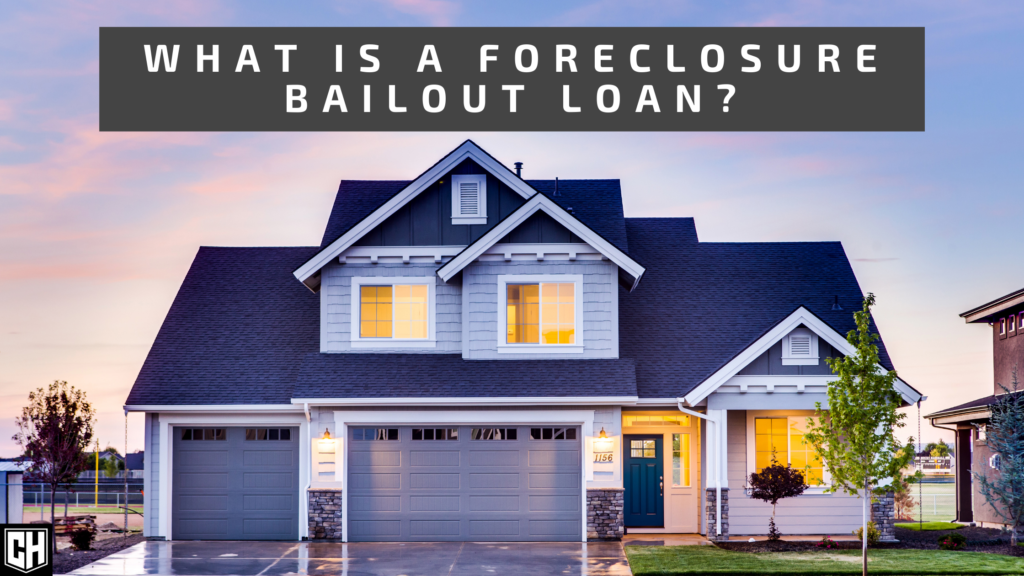If you are worried that your home is going to fall into foreclosure then you might feel tempted to find a fast fix to help you keep your house. Of course, you will need to be on the lookout for the many predatory lenders and scammers out there who prey on desperate homeowners. Because there is so much misleading information out the internet, it can be difficult to know what is best for you.
Even worse, foreclosures appear to be on the rise now that the foreclosure moratorium has come to an end.
If you’re behind on your mortgage payments, then one option to consider is a foreclosure bailout loan. To decide if a foreclosure bailout loan is right for you, you will need to begin by looking at your options and weighing out the long-term costs.
Keep on reading and we will take you through everything that you need to know to evaluate this potential loan type, including its various pros and cons.
What Is a Foreclosure Bailout Loan?
An owner occupied foreclosure bailout loan is a kind of hard money loan. This means that the loans are financed by private lenders instead of by traditional financial institutions, like banks.
This can greatly reduce the time frame required for funding. This is crucial if you are dealing with a tight deadline for payment or your foreclosure sale date is coming up.
This kind of loan can help you refinance the entire balance of the current mortgage. Or, it can give you the money needed to reinstate the defaulted loan. With either option, a foreclosure bailout loan will use your house as collateral.
This means that the loan is going to have high equity requirements. Equity is the difference between the value of your home and what you own on your current mortgage. With that said, these loans also come with fewer personal credit requirements compared to standard loans. This can make them easier for people who have low credit scores to access.
It’s also useful for people who don’t have the necessary income documentation.
How Much Does a Foreclosure Bailout Loan Cost?
Unfortunately, a foreclosure bailout loan will come with high fees. It is also going to come with a higher interest rate when compared to standard mortgages.
While it might seem like it is worth the cost to stay in your house, you will likely end up further in debt if you default again in the near future. In that case, you would still end up losing your house because of foreclosure.
You should ask the lender to show you how much money you will owe every month after all of the fees have been paid. You also will want to know how long you are going to need to pay the full balance.
Lastly, you will want to know what penalties are going to come with early or late payments so that you don’t end up with any surprise fees.
Are There Alternatives to Foreclosure Bailout Loans?
The other kinds of financing that you may be eligible for are going to mostly depend on your income and your credit score. With that said, the amount of equity that you have built up in the house and how far behind you are on the loan payments will also come into consideration.
If you are about to be foreclosed on then it’s not likely that you are going to be approved for a bank loan that is big enough to catch you up on the mortgage.
Despite that, the earlier you begin to ask for help from the lender, the more options you are going to have. If you reach out early enough, hopefully before you default on the mortgage, the lender might be able to alter the loan and delay or lower the monthly payments.
You should highlight any financial problems that you have come across. This could include a death in the family or you losing your job. This is going to boost your chances of coming to an agreement.
Also, if your loan is FHA approved then you may be eligible for a loan that is free of interest and will get the mortgage out of default.
If you are someone who has a steady income then you could also consider filing for Chapter 13 bankruptcy. This can let you stay in your house while you pay back what you owe.
Unfortunately, a bankruptcy will stay on the credit report for many years. This can make it harder for you to get loans in the future. However, this option will often cost you less than a foreclosure bailout loan in the long run.
The Ins and Outs of Foreclosure Bailout Loans
Hopefully, after reading this article, you have a better idea of what a foreclosure bailout loan is and whether it could be the right decision for you. As we can see, there are many risks associated with foreclosure bailout loans that could lead to you going deeper into debt.
It is a risky and expensive loan type to pursue, but sometimes this kind of loan can can a lifeline for people who have no other options available to them.
Are you looking for other useful and educational content? Explore the Finance section of this blog.
